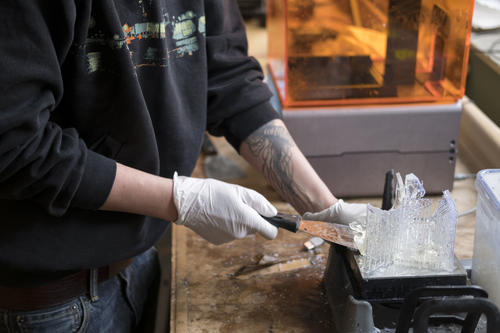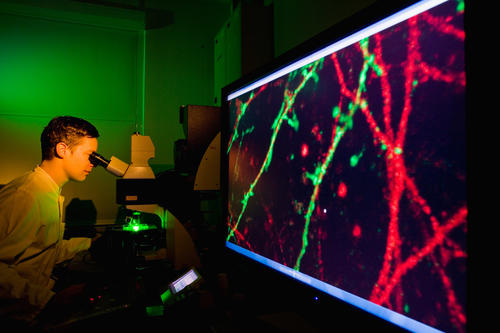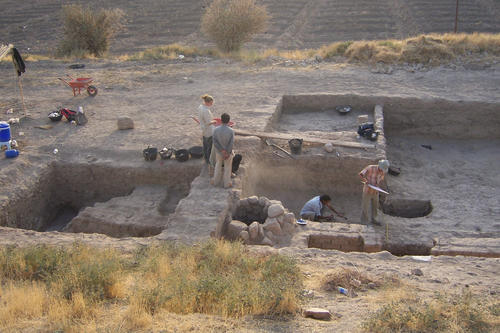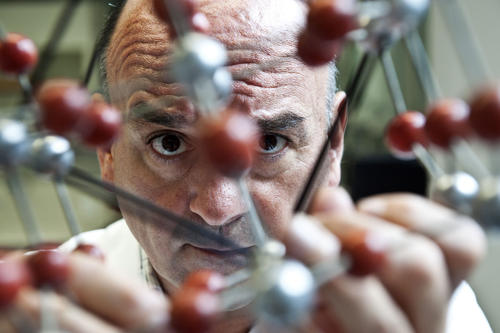Excellence Clusters within the Excellence Initiative
Collaborative research in a big way – important scientific questions can only be solved with an interdisciplinary approach and in a team
Excellence Clusters are large collaborative research projects where scholars and scientists from different disciplines work together on a promising topic. They are a line of funding by the Excellence Initiative of the German government, and the universities in Berlin were already very successful during the first phase of the competition in 2007. Four of the 37 national clusters were started in the capital: Languages of Emotion, NeuroCure, Topoi, and Unicat. Three of the Berlin clusters were extended during the second phase in 2012, and a new cluster Bild Wissen Gestaltung (Image Knowledge Design) was added.
At least two of the four partner institutions in Berlin are involved in the above-named clusters – either as joint applicants or through joint research projects. Numerous outside university research institutions, economic enterprises, and cultural institutions are involved as well.
The Excellence Clusters are a model of success. In the Excellence Strategy, the follow-up competition held by the government to fund cutting-edge research in Germany, there is a new funding program for this form of research association. And the Berlin partners were very successful in this competition.
In the fall of 2018, seven clusters of excellence were approved for funding within the Excellence Strategy. As of January 1, 2019, these interdisciplinary research projects are being funded each with up to ten million euros per year. You can read more about the excellence clusters within the German Excellence strategy here.
Overview of Clusters within the Excellence Initiative:
Image Knowledge Gestaltung. An interdisciplinary laboratory
New in basic research: Humanities scholars, scientists, and engineers, as well as medical doctors work together with designers and architects in the Cluster Image Knowledge Gestaltung.
Image Credit: Matthias Heyde / HU Berlin
The solution to complex problems requires the knowledge and expertise of researchers from various fields of knowledge. The Interdisciplinary Laboratory Image Knowledge Gestaltung is one such union of social, natural, and engineering sciences and medicine as well as – a first for basic research – design and architecture.
More than 25 different disciplines conduct research into fundamental design processes in the sciences in the laboratory together. The focus here is the central role of images in gaining, modeling, transmitting, and recording findings, in particular, against the background of the development of digital imaging processes and virtual visual imagery.
Host university: Humboldt-Universität zu Berlin Participants: Freie Universität Berlin and Technische Universität Berlin, as well as the Berlin University of the Arts, the Weißensee Academy of Art Berlin, the German Federal Institute for Material Research, the Max Planck Institute of Colloids and Interfaces (MPIKG) Potsdam, the Max Planck Institute for the History of Science Berlin, the Museum of Natural Science Berlin, the Bauhaus Dessau Foundation, as well as Stiftung Preußischer Kulturbesitz (the Prussian Cultural Heritage Foundation) are all participants.NeuroCure
A look into the fluorescent microscope: In the NeuroCure Excellence Cluster, scientists investigate the mechanisms of neurological illnesses.
Image Credit: NeuroCure / Juergen Loesel
In the NeuroCure Excellence Cluster, scientists explore the mechanisms of neurological illnesses in order to find innovative treatment methods. Building on the initial focus on medical conditions such as stroke, multiple sclerosis, and epilepsy, the scientists now also conduct research on psychiatric disorders including Alzheimer’s, autism, depression, and schizophrenia.
In each of the individual fields of research, basic scientists work closely with clinicians – so that the research results can be used more quickly for the development of new therapies.
Host universities: Freie Universität Berlin und Humboldt Universität zu Berlin along with their joint medical school Charité - Universitätsmedizin Berlin Participants are the German Rheumatism Research Center Berlin, the Leibniz Institute for Molecular Pharmacology in Berlin, and the Max-Delbrüeck Center for Molecular Medicine in Berlin.Topoi - The Formation and Transformation of Space and Knowledge in Ancient Civilizations
Excavation at Tell Fecheriye in Syria: The Excellence Cluster Topoi deals with cultures of the ancient world.
Image Credit: D. Bonatz
In the ancient studies Excellence Cluster Topoi, experts from various disciplines research the cultures of the ancient world: The main focus is on the area around the Middle East, the Mediterranean, and the Black Sea, but the Eurasian steppe and Central Europe are also taken into account. The period being researched comprises a time span from the 7th millennium B.C. over late Antiquity and up to the early modern era.
With this broad view, developments such as migratory movements, the spread of innovations, or the transfer of knowledge over long periods and great distances are being researched. Among others philologists and archaeologists as well as geographers and other natural scientists all work together on the guiding concepts space and knowledge. Thus a new intensive form of cooperation in the small disciplines has established itself in the last ten years.
Host universities: Freie Universität Berlin and Humboldt-Universität zu Berlin Participating institutions are Technische Universität Berlin as well as the Berlin-Brandenburg Academy of Sciences and Humanities, the German Archaeological Institute, Hochschule für Technik und Wirtschaft Berlin, the Max Planck Institute for the History of Science, and the Stiftung Preußischer Kulturbesitz.UniCat: Unifying Concepts in Catalysis
UniCat works toward using sources of energy and raw materials more efficiently.
Image Credit: Jacek Ruta/PR/TU Berlin
The goal of the UniCat Cluster: Unifying Concepts in Catalysis is to develop catalysts for a more efficient use of energy sources and raw materials as well as to produce new active agents with the help of synthetic biology.
The areas of application extend from medicine to car engines. In order to transfer the results into industrial applications more quickly, a joint laboratory was established by Technische Universität Berlin together with BASF, the BasCat.
Host university: Technische Universität Berlin; Co-applicants: Freie Universität Berlin and Humboldt-Universität zu Berlin. Participants: Fritz Haber Institute of the Max Planck Society in Berlin, Max Planck Institute of Colloids and Interfaces (MPIKG) in Potsdam, University of Potsdam Industry partners: BASF SE, Bayer HealthCare, Evonik, PolyAn, Sanofi-Aventis, Siemens, SüdChemie, and Uhde



